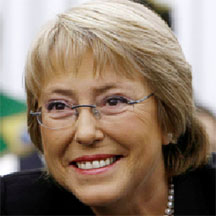SANTIAGO (Reuters) – Chile’s president, Michelle Bachelet, unveiled plans yesterday to ease a complete ban on abortions in the socially conservative South American country.

In a televised address, leftist Bachelet said she was sending Congress a draft bill that would permit abortion when a mother’s life is at risk, a foetus will not survive the pregnancy, or in the case of rape.
The outright ban on terminations was put in place during the final days of Augusto Pinochet’s 1973-1990 dictatorship. A number of attempts since then to legalize abortion have been blocked by right-wing legislators.
“I know this is a sensitive issue,” said Bachelet, a trained paediatrician.
“There isn’t always agreement on issues that relate to each person’s conscience.”
Following her signature on the draft bill, the document now goes to Congress. Campaigners supporting Bachelet’s proposal say the ban on terminations forces many women to endure dangerous back-street abortions in often-unsafe conditions.
Estimates on how many illegal abortions are carried out in Chile range from 15,000 to 160,000 per year.
In a country where the Catholic church retains a strong influence, anti-abortion activists remain a powerful lobby group.
“It astounds me that today we’re putting the right to liberty before the right to life,” said Senator Jacqueline Van Rysselberghe of the right-wing UDI party.
Before the total ban, abortions had been permitted under special circumstances, including when there were serious health risks associated with a pregnancy.
Attitudes have been slowly softening toward abortion in Chile, in part because of headline-grabbing scandals including the 2013 case of an 11-year old-girl who became pregnant after she was raped by her stepfather, according to authorities.
“This is a step in the right direction. But the law also has to assure that women, regardless of their economic situation, can access abortion services,” said Ana Piquer, head of Amnesty International in Chile, referring to concerns that public and private health insurance policies may not cover all costs.
In Latin America, El Salvador and the Dominican Republic also show signs of softening their stringent stance on abortion.




